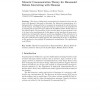2934 search results - page 36 / 587 » Hypothesis Spaces for Learning |
IJAIT
2008
13 years 11 months ago
2008
ion mechanism to create a representation of space consisting of the circular order of detected landmarks and the relative position of walls towards the agent's moving directio...
ICML
2007
IEEE
14 years 11 months ago
2007
IEEE
Many robot control problems of practical importance, including operational space control, can be reformulated as immediate reward reinforcement learning problems. However, few of ...
ISRR
2005
Springer
14 years 4 months ago
2005
Springer
d a human. The meta proto-symbols are a little more abstract analogy of the proto-symbols and recognize/generate the relationship of the two. A hypothesis is then proposed as the p...
ALT
2000
Springer
14 years 7 months ago
2000
Springer
This paper provides a systematic study of inductive inference of indexable concept classes in learning scenarios in which the learner is successful if its final hypothesis describ...
AII
1992
14 years 2 months ago
1992
Most theoretical models of inductive inference make the idealized assumption that the data available to a learner is from a single and accurate source. The subject of inaccuracies ...

